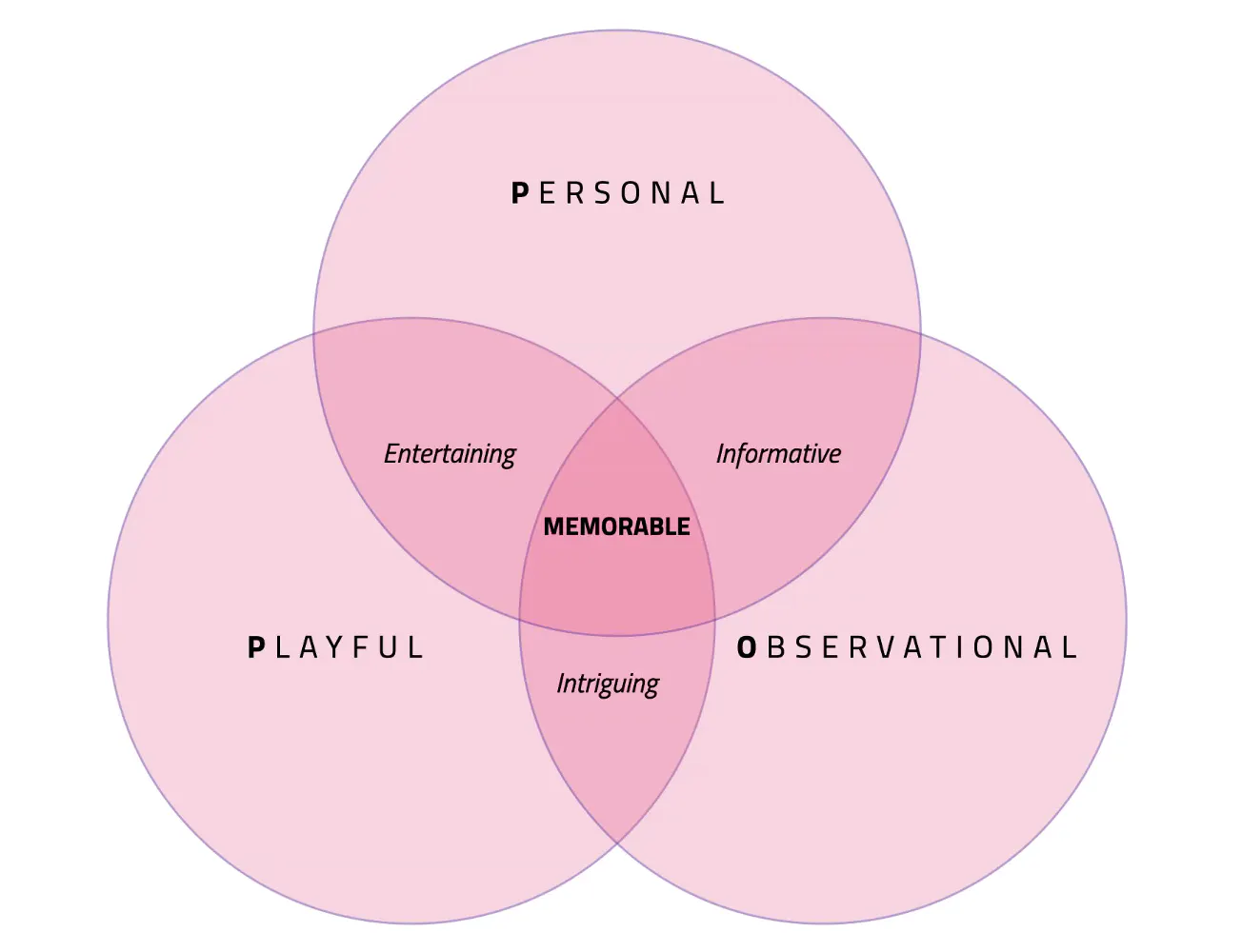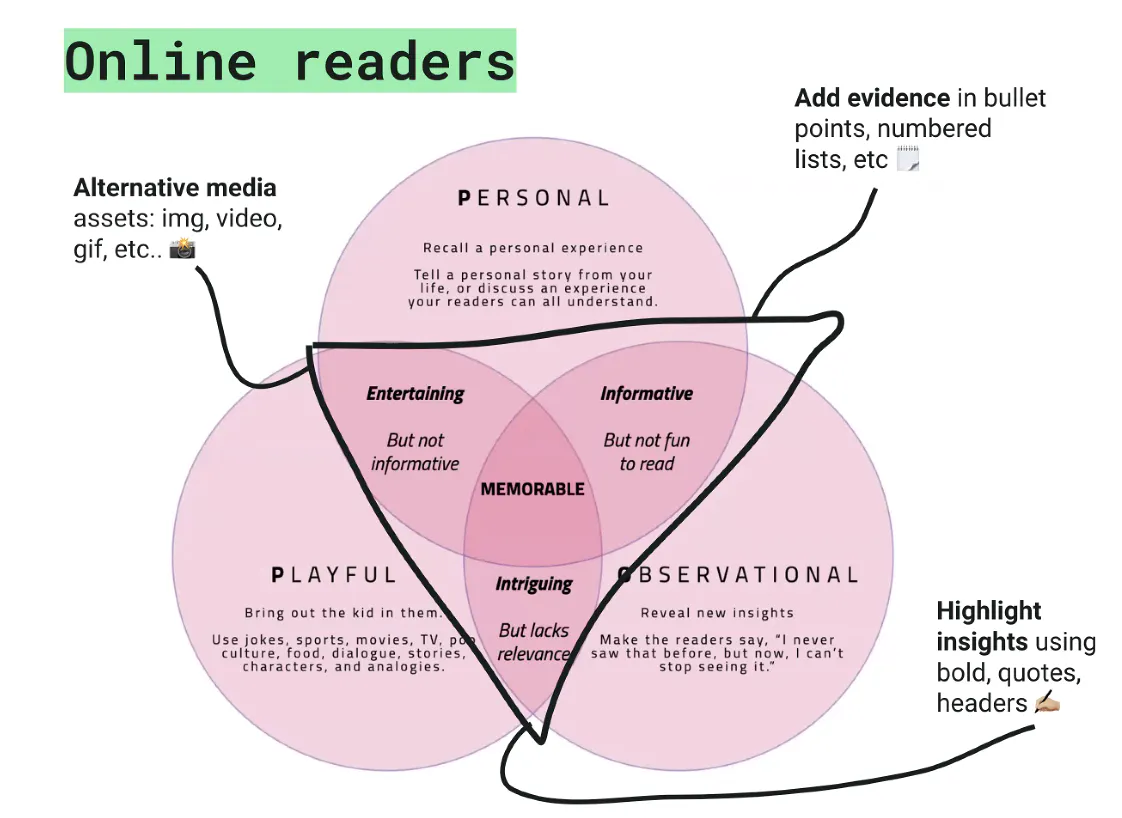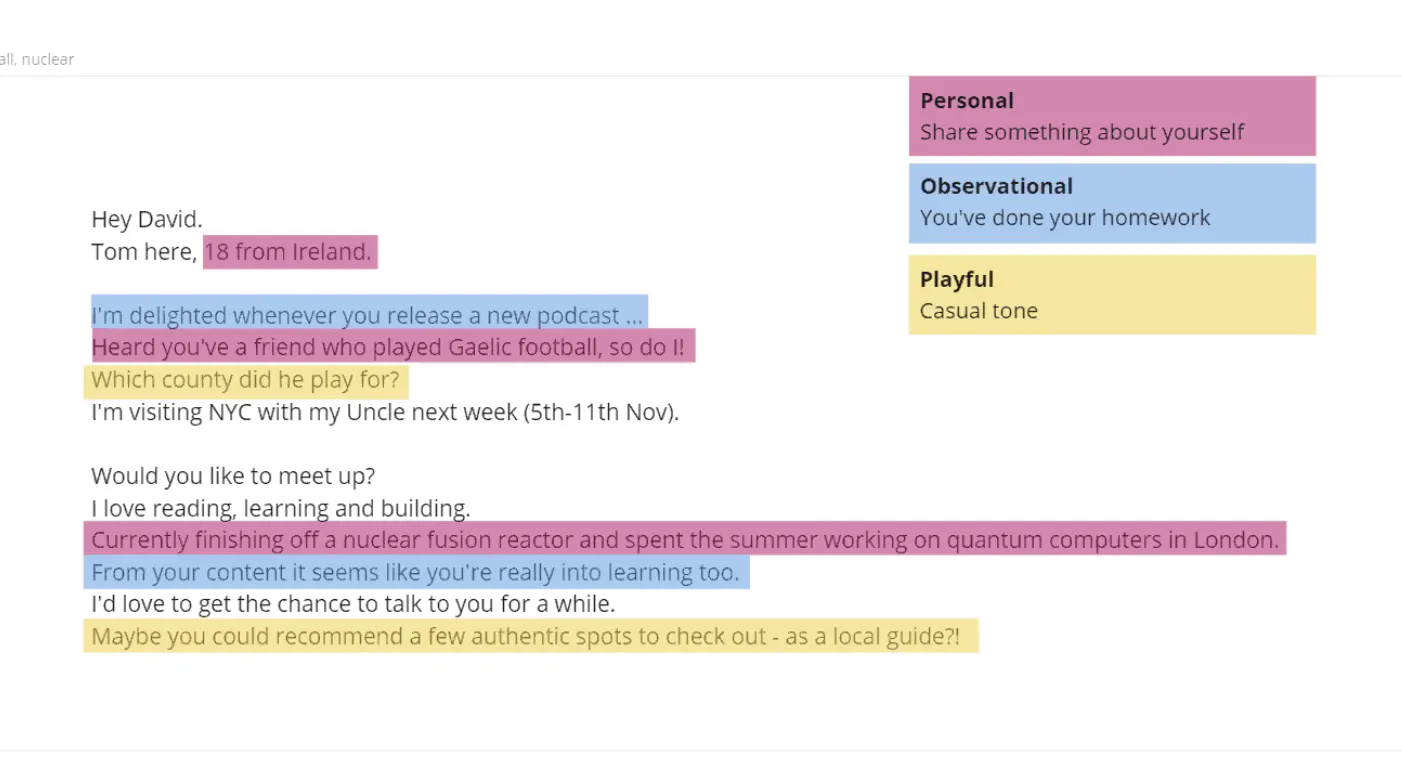10 Favorite Takeaways from Write of Passage Fall '21
October 17, 2021 / 6 min read /
0 Likes •
0 Replies •
0 Mentions
The Workshop
I recently finished the Fall 2021 cohort of David Perell's Write of Passage course. This is a cohort-based course with a heavy emphasis on small-group conversation, mentor sessions, and learning from your peers. Here are 10 of my favorite takeaways from the course, mostly from the many wonderful conversations I had with my fellow writers:
Ten Takeaways
1. Creation is Fishing in your Brain Soup
The act of creating anything is like fishing. You have some Platonic Ideal of The Thing living in the soup of WTF that is your brain. You see its silhouette lurking below the surface, and you've been tracking its movement for weeks, months, years even. To get it outside of your brain, somehow you have to fish The Thing out. You have to hook it, then you have to pull. And you have to hold on and keep your line in tact the entire time you reel it in.
2. Dunbar's Number for Opinions
In a conversation about the Ship 30 for 30 course, and the challenge of writing and publishing every day, someone said that they ran out of good opinions to write about around 15 essays in. At that point they had no familiar ground to stand on anymore, and just started writing about whatever could 500 words on the page: anthills, family recipes, trips out of the country.
This made me wonder if there is some consistent average for the number of strong opinions a person can hold and support. Like Dunbar's Number, but for things you feel strongly about.
3. Most writers have a POP strength and weakness
POP Writing is a Write of Passage acronym which stands for Personal, Observational, Playful. Good writing does two of three well, and exceptional writing does all three well.

POP Writing
I personally have the easiest time writing observationally, and struggle with playful writing. I assumed this would be the case for everyone because it seems so correct to me. Then it surprised me in conversations with others that some people considered themselves great at playful writing, and not great at personal writing!
It seemed like most people felt strong with one of the three and weak with another member of the triad. It would be interesting to survey writers and have them self-assess these three traits on a scale of 1-10 to see if this theory holds.
4. POP Writing mapped to Typography
Idea from Juliette Chevalier's mentor session about POP Writing mapping to typography:

POP Writing in Typography
- Evidence Providing features like bulleted lists are personal and observational
- Alternative asset features like memes and gifs are playful and personal
- Highlighting features like callouts and bolding are playful and observational
5. Go to the museum with the museum guy
To illustrate the idea of finding the fanatics, or learning from the people most invested in a subject you have some interest in, David gives the following advice:
"If you want to go to the museum, find the museum guy you know, and go to the museum with them."
6. Expert Decomposition, Creative Decomposition, and the Architect-Archaeologist Spectrum
Creating is fundamentally a decomposition of something scattered and complex into something more distilled and useful. In one conversation we made a distinction between expert decomposition and creative decomposition:
- The expert decomposes things in a way that makes them more useful.
- The creative decomposes things in a way that makes them more unique.
This mirrors Michael Dean's idea of the Architect-Archaeologist Spectrum. The architect structures their creative work upfront, and has metrics and goals and targets for accomplishment. The archaeologist's goals are less defined. They are looking for something in a fruitful site, and they unearth what they find slowly. They know they're onto something but don't know what it is or what it will do yet.
7. The best metaphors appeal to the senses
Given that we use around one metaphor per 10 seconds of written word or speech, it is in our best interest to step our figure-of-speech game up.
A metaphor's effectiveness is often much more tied to its vividness than to its accuracy. A metaphor that appeals intensely to the senses of sight, taste, smell, feel, or sound will do more than the most correct metaphor ever will.
"Metaphors like "The singer had a velvet voice" and "He had leathery hands" roused the sensory cortex, while phrases matched for meaning, like "The signer had a pleasing voice" and "He had strong hands," did not." Annie Murphy Paul, Your Brain on Fiction
“let’s just say that Ankh-Morpork is as full of life as an old cheese on a hot day, as loud as a curse in a cathedral, as bright as an oil slick, as colorful as a bruise and as full of activity, industry, bustle and sheer exuberant busyness as a dead dog on a termite mound.” Terry Pratchett, Mort
8. Sharing links as a guided experience
There is little value in a link dump. 10 Websites I couldn't live without and Github ‘awesome’ pages are a dime a dozen. And no one has time for these. Sharing links and curation has to be a guided experience. You are the ranger who has seen all the trails. You have to be your reader's guide, you have to offer perspective. Don't tell them it exists, tell them why it matters.
And yes, I realize the irony as I write yet another top 10 list. 🙃
9. POP writing in cold emails
The POP writing framework can apply to cold emailing, or reaching out to potential connections. Show you respect the persons' time, that you know their work deeper than surface level, and qualify yourself in a non-tryhard way. Here is Michael Dean's breakdown of POP writing in a cold email sent to David:

Cold email, but not dreadful!
10. Our own words can fail to surprise us
One thing that's challenging about writing, especially as a novice writer trying to find a voice, is that the end product often times feels underwhelming. We pour over pages and notes and stare into the screen for hours to get that draft to a point that it's done. But then reading over it end to end for the first time, it often doesn't feel like it jumps off the page like our favorite writers' writing does. It doesn't even feel like it's in the same league as our peers' writing sometimes.
One explanation for this is that it's hard to surprise yourself with your own words. These are the same words and images and metaphors that you've been describing your great idea to yourself with in your head for weeks. So you've HEARD it all before. But this may not be the case when someone else reads it. This may be why anyone else's writing feels so fresh to read after working on your own writing. Simply because they are using any words at all that are not your own.
Fetching Replies...
Do you have any questions, comments or simply wish to contact me privately? Don’t hesitate to shoot me a DM on Twitter.
Want more jmill in your life?
Get a monthly email from me about my ideas, as well as exclusive previews of upcoming articles and projects.
Here are 10 of my favorite takeaways from Write of Passage Fall '21.